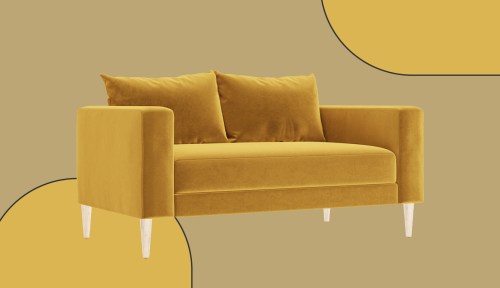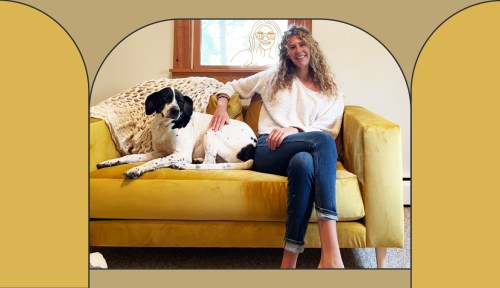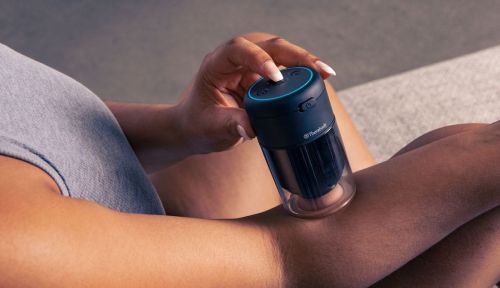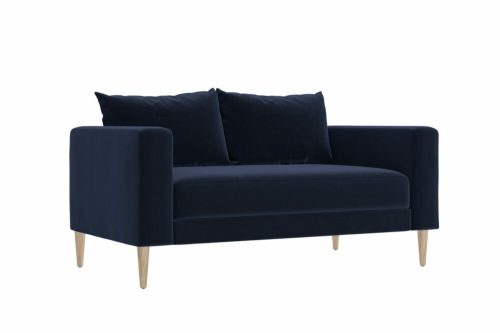Our editors independently select these products. Making a purchase through our links may earn Well+Good a commission
As a professional product tester, it’s part of my job (and part of my personal ethos, honestly) to keep a finger on the pulse around sustainable and ethical innovation. Growing consumer sentiment and awareness of impending climate doom has driven a demand for more Earth-friendly stuff. Beauty and personal hygiene products, home cleaning solutions, closed-loop apparel and ethically sourced accessories, eBikes and electric cars—the list of sustainable products (or at least, products that seem sustainable) is seemingly endless. My inbox of product launches is living proof.
Experts in This Article
Phantila Phataraprasit is the CEO and co-founder of Sabai, a sustainable furniture company.
But a couch? Or, more broadly, sustainable furniture? To be totally transparent, I’d never really thought about it. It makes sense—the same recycled fabrics and ethically sourced materials used to make everything else can be used to make chaises and accent chairs. It just… never really crossed my mind.
So when an opportunity to try a Sabai Essential Loveseat ($1,095) came across my desk, my interest was immediately piqued. For one, I needed a new couch, particularly one that was small-space friendly. Less self-serving, Sabai’s whole schtick resonated with me: sustainable, affordable custom furniture that was trendy to boot? Count me in.
Sabai, The Essential Loveseat — $1,095.00
This trendy loveseat is perfect for small spaces and comes in 10 different sustainable upholstery options. Choose your fabric color and material (recycled velvet or upcycled poly), your leg option, and hit “Add To Cart.”
The Sabai Essential Loveseat: An honest review
Assembly
Four weeks after putting my order request in, four large, flat boxes containing my cute lil’ couch arrived on my doorstep. As someone who’s spent many a night crying over Ikea instructions, I was pretty skeptical that this was going to be an easy build. Low and behold, the Sabai Essential Loveseat took me—no joke—20 minutes from start to finish to put together. Everything comes neatly packaged in just the right amount of packaging (aka, no excess foam or plastic wrap). The step-by-step instructions I downloaded are *actually* easy to understand. I poured myself a glass of wine and my loveseat was built before I could even finish it. Move over, Geico, these pieces are so easy a caveman could do it.
Look and feel
Simplicity aside, I immediately fell in love with the look of my new loveseat. All of Sabai’s pieces are entirely customizable, allowing you to mix and match with fabric type and color, legs, and sizes. I landed on a sunny yellow recycled velvet paired with natural wooden legs since I wanted to brighten up my space, but choosing between the rich, jewel tones, like emerald and navy, and the minimalist classics, like white and grey, was no easy feat.
At just 62 inches long, it fits perfectly in my small office, giving me a comfy space to write and lounge on when I need a break from my desk. I absolutely love the vibrant hue and its soft, velvety finish (as does my dog). Dressed up with a throw blanket and a few pillows, and it looks like it was styled by an interior designer, minus the luxury price tag.

Quality and price point
Speaking of luxury price tags… for custom furniture—particularly pieces that are responsibly sourced—Sabai is pretty affordable. Accessibility to high-quality, planet-friendly pieces without the markup is what drove co-founder and CEO Phantila Phataraprasit to launch a furniture brand in the first place.
“There’s this gap of people who care [about the environment] and what’s available to them,” Phataraprasit says. At Sabai, she explains certain decisions are made to ensure costs are kept low, without ever compromising the aesthetics of the product itself. For example, the pieces are flat-packed, which are less expensive to ship than pre-assembled furniture, but they definitely don’t look like they come out of a box. Fabric is up-cycled or made from recycled plastic bottles, but it looks like luxurious, expensive upholstery.
“It’s a balancing act for sure in terms of designing it in a way that reduces costs and is more affordable, but also making it well designed so that you’re happy with the product… we’re definitely happy to have gotten it to the price point we have,” she says.
Sustainability
And of course, there’s the sustainability aspect, which is Sabai’s hero ingredient. Everything, from major components (like supply chain partnerships and local sourcing) to little details (like downloadable instructions over paper and plastic-free shipping), is thoughtfully curated. Responsibly-made furniture that cuts down on waste for the long-haul with closed-loop solutions—that’s the brand’s guiding compass.
Most obviously are the materials, which as I mentioned, are recycled, up-cycled, or responsibly sourced, primarily within 90 miles of Sabai’s production facility in High Point, North Caroline. But the devil’s in the details—the brand is consistently looking for ways to level up its goodness game, for shoppers and the planet: The chemicals and glues are strategically chosen and used minimally to reduce at-home off-gassing. The wooden legs are FSC-certified, while foam inserts are tested rigorously for emissions. Even tiny, invisible details—like swapping synthetic webbing to jute and burlap—are considered and make a big difference in the grand scheme of sustainability.
“We’re consistently doing audits of our products to see where we can increase the use of even more sustainable materials. New innovations are happening all the time, and so it is really necessary and advantageous to keep taking a look at things rather than just saying like, ‘Oh, we’re done,'” Phataraprasit says.
The closed loop factor is another huge selling point. Say my dog scratches the arm of the couch—rather than tossing this one completely, I can buy another arm through the brand’s Repair Don’t Replace program. Perhaps I want to turn my loveseat into a sectional—the brand sells corner units that allow me to expand, saving me (and my wallet) the extra resources. Similarly, if I do fall out of love with my little yellow couch (highly unlikely), I can sell it back to the company for 20 percent of the original retail price through the Sabai Revive program.
“Over 12 million tons of furniture ends up in landfills every year, so we look at that from the onset about how we can prevent that, be it through product design or programs like Revive,” Phataraprasit says. “We look at the full lifecycle of our products and it’s how we differentiate ourselves.”
Simple, stunning, sustainable: Sabai is worth every penny
Can you tell I really love my Sabai couch?! As I write this, I’m racking my brain trying to think of something that could be better about my little loveseat, or the brand in general, but I genuinely think it’s worth the cost. Aesthetics and comfort aside, the sustainability factor is its biggest selling point. I know my loveseat will last me a lifetime if I want it too—there are very few out-of-the-box furniture pieces that can do that.
If you’re in a small space, I can’t recommend the loveseat enough. It’s the perfect length for offices, apartments, your “she shed”—whatever space you’re trying to zhuzh up. If you have the extra space, go for the Essential Loveseat Sectional ($1,1445) for some added leg room while you lounge. Or start with the loveseat and see where it goes, you can always expand on it through the Repair Don’t Replace program or with a matching Ottoman ($395). The possibilities are plentiful, and something you, your wallet, and the planet can all enjoy.
Want to be the first to hear about the latest (and greatest) SHOP product drops, custom collections, discounts, and more? Sign up to have the intel delivered straight to your inbox.
Sign Up for Our Daily Newsletter
Get all the latest in wellness, trends, food, fitness, beauty, and more delivered right to your inbox.
Got it, you've been added to our email list.









